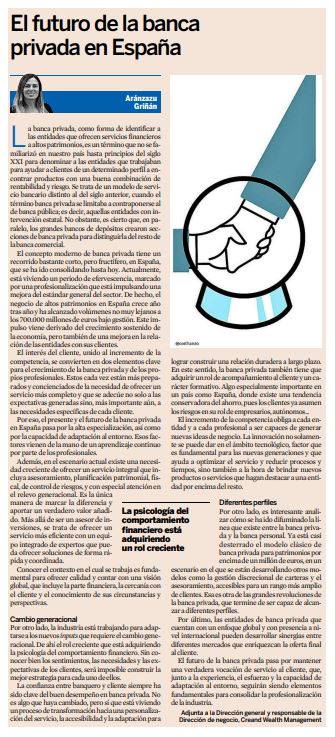The term private banking, in reference to those institutions offering financial services to high-net worth individuals, was not in popular use in our country until the early 21st century, to denote those institutions that worked to help clients with a certain profile to find products with a good combination of profitability and risk. This is a different model of banking service to that of the previous century, when the term private banking was limited to contrasting it with public banking, those institutions with state involvement. However, it is true that, at the same time, the large deposit-taking banks created private banking sections to distinguish it from the rest of retail banking.
In short, the modern concept of private banking has a fairly short but fruitful history in Spain, and it has been gradually consolidated up to the present day. It is currently experiencing a boom, marked by a professionalisation that is driving an improvement in the general standard of the sector.
In fact, high-net worth business in Spain is growing year on year, already reaching volumes close to EUR 700 billion under management. This boost is the result of sustained economic growth, as well as an improvement in banks’ relationships with their clients.
Client interest, together with increased competition, are two key elements for the growth of private banking and of the private bankers themselves. They are increasingly prepared and aware of the need to offer a more complete service that meets the expectations generated. And more importantly, the specific needs of each client.
This is why the present and future of private banking in Spain is about a high level of specialisation, as well as the need to adapt to the environment. These factors go hand in hand with continuous learning by professionals. In addition, the current scenario presents the increasing need to offer a holistic service that includes advice, asset planning, tax planning and risk control, with special attention given to generational handover. This is the only way to stand apart from the rest and bring true added value. Beyond offering investment advice, it calls for a more efficient service that will provide a complete team of experts who can deliver solutions quickly and in a coordinated manner.
Understanding the context in which we are working is crucial to offering quality and having an overall vision, which encompasses the financial aspects, closeness to the client and an appreciation of their circumstances and perspectives.
Meanwhile, the industry is working to adapt to these new inputs required by generational change. Hence the growing role of the branch of financial behavioural psychology. Without a sound understanding of the feelings, needs and expectations of our clients, it will be impossible to build the best strategy for each of them.
Trust between the banker and the client has always been key to good performance in private banking. This has not changed, but a process of transformation is underway towards service personalisation, accessibility and adaptability, with a view to building long-lasting relationships. In this regard, private banking must also take on a role of client support and training. This is particularly important in a country like Spain, where there is a conservative tendency towards savings, as clients already assume the risks in their role as business owners, freelancers, etc.
Increased competition forces every bank and every professional to be able to generate new business ideas. Innovation can occur not only in the technological field, which is a fundamental factor for the new generations and helps to optimise the service and reduce processes and lead times, but also when it comes to providing new products or services that distinguish one bank from the rest.
Furthermore, it is interesting to look at how the line between private banking and personal banking has become blurred. The classic model of private banking for assets above 1 million euros has almost been phased out, in a scenario in which other models such as discretionary portfolio management and advisory services, accessible to a wider range of clients, are being developed. This is another of the great revolutions in private banking, that of being able to reach out to different profiles.
Finally, private banking institutions with a global focus and international presence can develop synergies between different markets that enrich the final offer to the client.
The future of private banking will ultimately depend on maintaining a true vocation for customer service, which, alongside experience, effort and the ability to adapt to the environment, will continue to be fundamental to consolidate the professionalisation of the industry.
Published in Expansión 12.03.24
